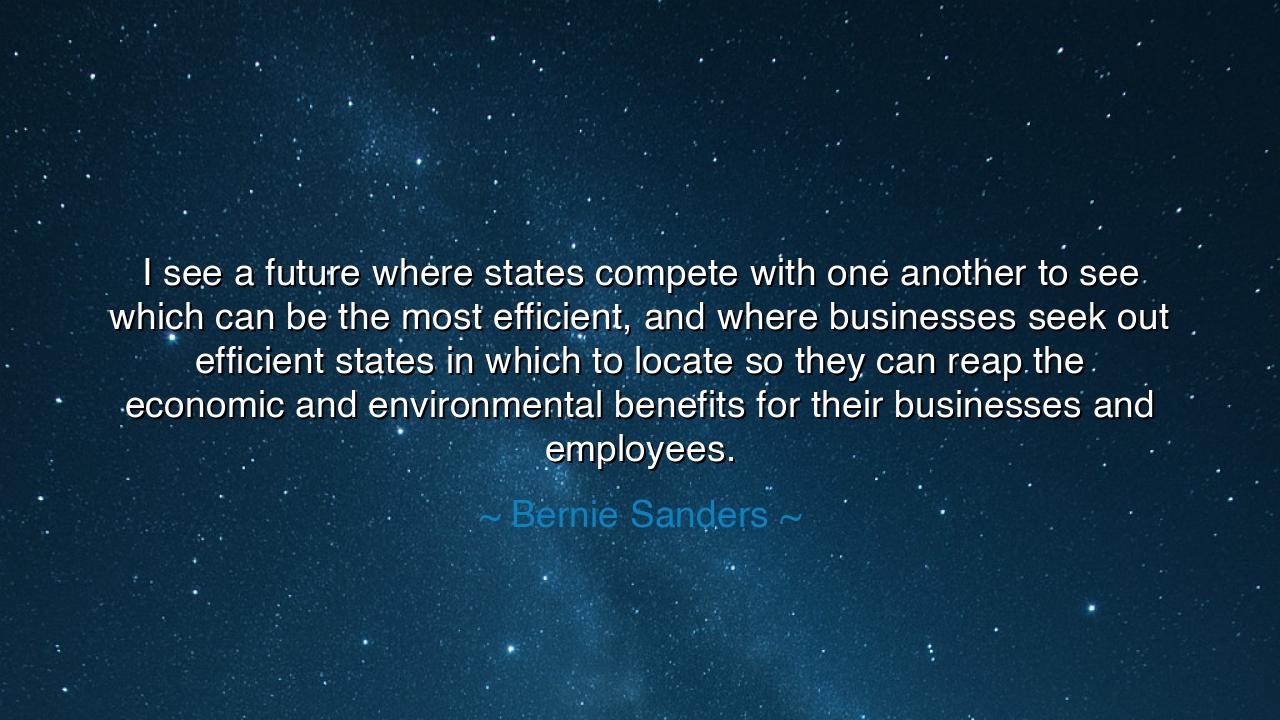
I see a future where states compete with one another to see which
I see a future where states compete with one another to see which can be the most efficient, and where businesses seek out efficient states in which to locate so they can reap the economic and environmental benefits for their businesses and employees.






The words of Bernie Sanders—“I see a future where states compete with one another to see which can be the most efficient, and where businesses seek out efficient states in which to locate so they can reap the economic and environmental benefits for their businesses and employees.”—are a vision not merely of politics, but of harmony between progress and preservation. In these words, Sanders speaks as a prophet of a new kind of civilization—one where power and prosperity are measured not by how much we consume, but by how wisely we use. It is a dream in which governments and industries no longer clash with nature, but work in rhythm with it; where competition is not for dominance, but for excellence; and where efficiency becomes not a corporate buzzword, but a moral duty.
The origin of these words lies in Sanders’ lifelong struggle for justice—economic, social, and environmental. As a champion of the working class, he has long seen that the same forces that exploit labor often exploit the earth. His call for efficiency is not merely about saving money, but about saving meaning. For in a world choking on waste—wasted energy, wasted potential, wasted time—the act of becoming efficient is an act of redemption. He envisions a world where each state, each community, strives to become a model of balance—where innovation serves humanity rather than enslaves it. It is a vision in which competition breeds sustainability, and where success is defined by the wellbeing of both people and planet.
The ancients would have understood this vision well. In the time of Solon of Athens, wise governance was not measured by conquest or wealth, but by the harmony of the polis—the city as a living organism. Solon taught that justice must flow like water, reaching every household, rich and poor alike. In Sanders’ future, the same principle flows: justice through efficiency, prosperity through responsibility. The states that honor this truth—those that manage their energy, resources, and people with care—will become beacons for others. And just as the old Greek city-states competed in virtue, so might modern states compete in sustainability.
Consider the real-world example of Scandinavia, where nations like Denmark and Sweden have embraced efficiency as both a moral and economic philosophy. They lead the world in renewable energy, recycling, and equitable labor systems. Their industries thrive not because they exploit, but because they innovate. Their people live not in excess, but in balance. Businesses from around the world are drawn to these lands—not only for profits, but for the quality of life they offer. This is the world Sanders envisions: where environmental stewardship becomes the foundation of economic strength, not its casualty.
Yet Sanders’ vision is also a challenge, for efficiency requires courage—the courage to confront old habits, to cast aside the illusion that endless growth means endless prosperity. The wasteful system, like an overfed beast, devours itself in time. But the efficient system, lean and mindful, endures like a river that replenishes rather than drains. In his quote, Sanders warns us that the future will not reward those who exploit the earth’s abundance, but those who preserve it. It is not merely a call for policy, but for discipline of spirit—a reminder that wisdom begins in restraint.
His words also carry a quiet optimism, a faith in human creativity. Sanders does not imagine a world of austerity, but of abundance rightly used. He trusts that businesses, once freed from short-term greed, can become engines of healing; that states, once freed from corruption, can become laboratories of progress. His vision transforms competition from a tool of division into a catalyst for collective growth. Each state that strives to be more efficient uplifts the others by example, and each act of sustainability becomes a victory not just for one, but for all.
The lesson, then, is clear and timeless: efficiency is wisdom in action. It is the art of doing more with less, of harmonizing desire with necessity, of making prosperity sustainable. As the ancients tended their fields in rhythm with the seasons, so too must modern societies tend their industries in rhythm with the earth. We must each become stewards—citizens who seek not to conquer nature, but to cooperate with it.
So let these words of Bernie Sanders be carried forward as a vow: to build a future where innovation serves life, not profit alone; where governments compete in compassion, and businesses prosper through stewardship. Let every citizen, every leader, and every worker see themselves as part of this sacred endeavor—to make our world efficient not in greed, but in grace. For in that harmony of purpose lies the truest measure of civilization, and the promise of a future worthy of the generations yet to come.






AAdministratorAdministrator
Welcome, honored guests. Please leave a comment, we will respond soon